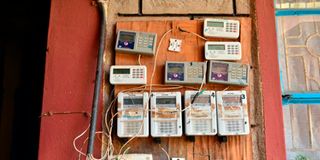Kenya Power makes U-turn, readmits banks to sell tokens

Pre-paid electricity token machines provided by Kenya Power. Kenya Power has reversed its earlier decision to lock out banks from selling electricity tokens for pre-paid customers.
Kenya Power has reversed its earlier decision to lock out banks from selling electricity tokens for pre-paid customers, reopening an additional revenue stream for the firms.
Two large banks, Equity Bank and KCB have already notified their customers that they can now resume buying prepaid electricity tokens through their banking applications or dedicated USSD codes.
“Kenya Power tokens zimerudi (Kenya Power tokens are back). Buy tokens by dialing *247# using Equitel, Equity Mobile app/online, EVA chatbot,” said Equity in a notice to customers on Saturday.
KCB has also resumed vending tokens with its customers able to pay for prepaid and postpaid electricity bills by dialing the short code *522#.
Kenya Power could not be reached for comment on why it reversed its decision after just 10 months.
The utility firm on September 1 last year limited the purchase of power to its in-house M-Pesa pay bill number 888880 for prepaid customers and 888888 for postpaid users.
This came after it declined to renew the contracts of nearly a dozen token vending companies including PDSL, Cevens, Lexco One, Wawai, and Anchor.
Others were Korandu, African Vending Systems, Adtel, Radix, Dynamo Digital, and Digital Leo. Their contracts expired on August 31 last year. Postpaid clients were allowed to pay their bills using 13 bank accounts.
The banks are Absa Kenya, Citi Bank, Co-operative Bank, Family Bank, Equity, I& M Bank, and KCB Group.
Others include NCBA Group, Postbank, Stanbic Bank, National Bank of Kenya, and Diamond Trust Bank.
The utility had argued that the decision to fully move the purchase of electricity in-house was informed by a belief that it had built enough capacity to handle the large volume of payments it processes daily.
“We wish to inform our prepaid and postpaid customers that effective Thursday, September 1, 2022, the purchase of prepaid tokens and payment of postpaid bills will only be made through (internal channels),” said the utility at the time.
Kenya Power added that the move would further enable it to cut costs paid to commissions paid to the vendors who processed only 10 percent of its total electricity bill payments at the time.
“Please note that no other third-party agent is authorised to offer these services on behalf of KPLC. The company will therefore not take liability for any transaction conducted through any other platform,” it added.
But in a boost to the third-party vendors, the utility has now reversed its decision with several banks resuming the sale of electricity tokens.
Kenya Power had severally come under scrutiny by consumers over the delayed remission of tokens purchased.
Part of this has been linked to unreliable services by third-party vendors prompting the utility to upgrade its internal token dispensing system.
Further, a global concern among firms is that third-party vendors pose a risk of control and accountability which exposes the contracting firms to operational and reputational risks, revenue losses, and even backlash by regulatory authorities.
Last year’s ban on third-party token sales was the second in three years that the State power utility has banned third parties from making purchases for customers amid the rise in fraudulent deals.
In 2019, Kenya Power stopped third parties from buying tokes for customers, prompting protests from the Consumer Federation of Kenya (Cofek).





